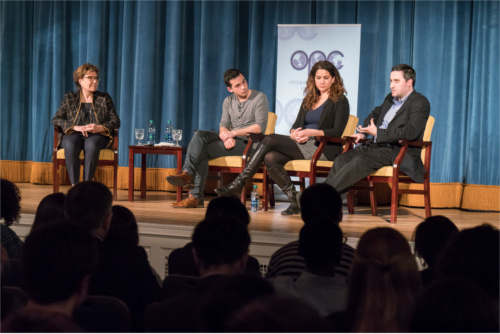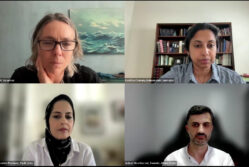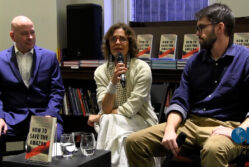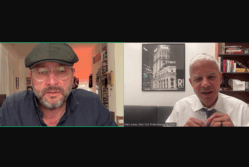Event Coverage Highlight

Middle East Experts Voice Concern Over Trump’s Murky Policies
By Chad Bouchard
President Donald Trump still lacks a clear policy in the Middle East, which could leave the U.S. open to manipulation from autocratic governments in the region and embolden terrorists, experts said during a panel on March 1.
The forum, hosted by the OPC and International House, was part of a gathering of foreign correspondents who covered the Middle East.
Ben Taub, the 2015 Emanuel R. Freedman scholar and a contributor to The New Yorker who has written extensively on jihadism in Europe and the war in Syria for the last two years, said Trump does not have “any grasp” over what’s going on in the region, favors a simplistic view of affairs and strong-man oppression to maintain stability.
He said meanwhile the United Nations is enabling the Bashar al-Assad regime and losing credibility by failing to act decisively against war crimes.
“Every failure in Syria contributes to the inability of these institutions to represent their fundamental founding principles, and creates an environment in which future war crimes can be perpetrated with impunity all over the world.”
Leila Fadel, the Edward R. Murrow Press Fellow at the Council on Foreign Relations who won the 2013 Lowell Thomas Award, has worked for 11 years in the Middle East and was most recently National Public Radio’s international correspondent based in Egypt. She said authoritarian leaders like Egyptian President Abdel Fattah al-Sisi see Trump’s lack of policy as an opportunity for influence. She said al-Sisi and other leaders are eager for the U.S. to name the Muslim Brotherhood, a key political opponent, as a terrorist organization.
“And that will have huge ramifications not only in the region but also in the United States and Canada, where organizations have connections to this not only religious but also political organization.”
She adds that Saudi Arabia, Iran and other Middle Eastern countries are testing boundaries right now, jockeying for position before U.S. policy becomes defined, perhaps as a result of a future catastrophe.
Deborah Amos, the OPC’s first vice president who covered the Middle East for NPR News, moderated the discussion. She asked Mohamad Bazzi, an associate professor of journalism at New York University who is currently writing a book on the proxy wars between Saudi Arabia and Iran, if Trump’s administration – including cabinet members like National Security Adviser Herbert Raymond McMaster with strong anti-Iran ties – can “tame” Iran.
He said Trump will likely soon find that the few policy goals he has made public, including getting tougher on Iran and focusing on defeating ISIS without committing ground troops, are incompatible.
“He’s not going to be able to effectively confront ISIS and at the same time isolate Iran and take on Iran in the way that he thinks he says he wants to do,” Bazzi said. “This is not an administration that handles nuance too well.”
Bazzi added that Trump’s tendency to take attacks personally, as an affront to his “honor,” makes it very tempting for terrorists to attack and provoke. “He’s giving ISIS such leverage over him.”




